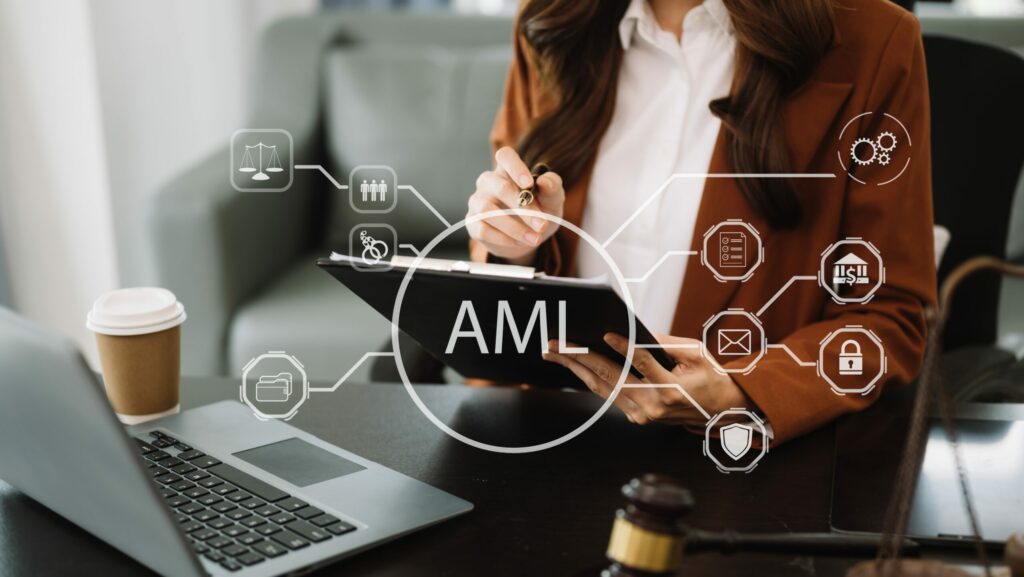Anti Money Laundering (AML): How to Be Compliant
Money laundering is frequently linked to illegal activity, including drug trafficking, embezzlement, corruption, tax fraud, human trafficking, and organized crime among others. To prevent this, anti-money laundering (AML) regulations around the world are set up. Discover what it takes to stay compliant with AML regulations.
What is AML?
An AML check refers to the process of verifying the identity of individuals or entities to prevent money laundering, terrorist financing, and other financial crimes. An AML check ensures that businesses comply with regulatory requirements and maintain the integrity of the financial system.
During an AML check, financial institutions, such as banks, payment processors, and other regulated entities obligated to follow AML regulations, conduct due diligence on their customers. The process typically involves collecting information and documentation to establish the identity of customers and assessing the potential risk they pose in terms of money laundering or illicit activities. It also entails ongoing monitoring of transactions and activities to detect and report suspicious behaviors.
Who Should Be Compliant?
Any corporation recognized as a “financial institution” is required to create and maintain an anti-money laundering policy. This includes banks, credit unions, lenders, insurers, broker-dealers, gaming, casinos, and more. Moreover, AML regulation could also apply to a broader spectrum of entities such as high-value dealers such as art and antiques where cash payments exceed €10,000 (amount could vary according to the jurisdiction), real estate agencies, legal professionals, accountants, and virtual currency platforms.
Why is AML Compliance Important?
Conducting AML forms a critical foundation in the detection and prevention of money laundering, fraud, and terrorist financing, especially with the impact that non-compliance can have on firms. The United Nations Office on Drugs and Crime (UNODC) estimates that 2–5% of global GDP is laundered each year. That amounts to between EUR 715 billion and 1.87 trillion each year.
Non-compliance can result in severe penalties, including fines, legal action, and damage to reputation. For instance, in 2023, financial institutions globally were fined $6.6 billion for AML violations, marking a 57% increase from the previous year. The highest individual fine was $4.3 billion imposed on one cryptocurrency exchange company, for significant AML failings.
Components of AML
To be compliant with AML regulations, various thorough checks and activities must be implemented. They are designed to identify and prevent illegal activities, ensuring financial institutions and other regulated entities adhere to the highest standards of financial integrity. It is important to note that AML is not a one-time activity; but rather an ongoing, comprehensive effort that includes numerous key components.
Customer Identification Program (CIP)
First, the customer identification program (CIP) involves the gathering and verification of personal information such as name, address, date of birth, and government-issued identification like passports or driver’s licenses. In this step, the government-issued documents are checked for their authenticity, to make sure it is not forged. Efforts like a biometric check could also be made to prevent impostor fraud.
Risk Assessments
In addition to verifying a client’s identity during account creation, AML screening also consists of measuring the risk level of the client. This could be done by cross-checking relevant information databases, such as sanctions lists or politically exposed person (PEP) lists. A PEP list is a list of people who hold or have held prominent public positions. This could include senior politicians, judicial or military authorities, or state-owned corporate leaders. Being a PEP does not imply any crime but indicates a greater risk category, for example, bribery or corruption. A sanctions list is a list maintained by a government or international body that includes the names of individuals, groups, or countries who are subject to punitive action.
Enhanced Due Diligence (EDD)
Furthermore, for high-risk customers, enhanced due diligence (EDD) is necessary. This involves a more detailed investigation into the customer’s background and financial history, especially for those from high-risk countries or engaged in high-value transactions. Such scrutiny helps in mitigating the risks associated with these customers.
Transaction Monitoring
Transaction monitoring is critical to AML operations, with systems tracking transactions for suspicious behavior and software tools flagging anomalous transactions based on predefined thresholds, often using sophisticated algorithms and machine learning.
Reporting Suspicious Activities
When suspected money laundering activities are found, institutions must disclose them to appropriate authorities via Suspicious Activity Reports (SARs), providing prompt and accurate documentation.
Record Keeping
Record-keeping is also required, which includes storing transaction records, and other relevant documentation for a period of time, with an emphasis on convenient access for regulatory inspections and audits.
Training & Internal Controls
Employees must get frequent AML training programs to educate them about AML laws, regulations, and internal rules, as well as new trends and regulatory changes. To ensure compliance with AML requirements, internal controls and policies must be established, maintained, and reviewed regularly to reflect legislative changes and emerging threats.
Auditing
Furthermore, independent audits are performed to assess the performance of the AML program, and corrective measures are made to correct any flaws discovered during these audits.
Choose a Trusted Provider to Help You Comply with AML Regulations
Keesing Technologies helps companies comply with know your customer (KYC) and anti-money laundering regulations by making sure that your customers are who they really are. As an industry leader trusted by thousands of organizations, Keesing’s solutions offer accuracy, seamlessness, and reliability. Keesing AuthentiScan is an automated identity verification solution that checks the authenticity of government-issued documents, as well as performing biometric face verification. Optionally, customers can check individuals against PEP and Sanctions lists. With AuthentiScan, it generates a detailed audit trail for each ID check and offers various options for management reporting.
If you would like to know how Keesing’s solutions can assist you in your compliance efforts, contact us via email or +31 (0)20 7157 825 and we will be happy to show you a free demo.

